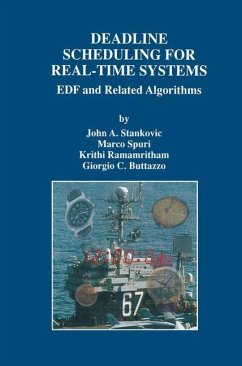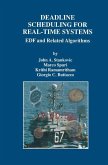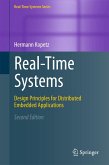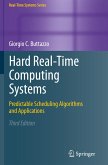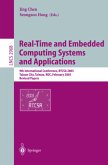Many real-time systems rely on static scheduling algorithms. This includes cyclic scheduling, rate monotonic scheduling and fixed schedules created by off-line scheduling techniques such as dynamic programming, heuristic search, and simulated annealing. However, for many real-time systems, static scheduling algorithms are quite restrictive and inflexible. For example, highly automated agile manufacturing, command, control and communications, and distributed real-time multimedia applications all operate over long lifetimes and in highly non-deterministic environments. Dynamic real-time scheduling algorithms are more appropriate for these systems and are used in such systems. Many of these algorithms are based on earliest deadline first (EDF) policies. There exists a wealth of literature on EDF-based scheduling with many extensions to deal with sophisticated issues such as precedence constraints, resource requirements, system overload, multi-processors, and distributed systems.
Deadline Scheduling for Real-Time Systems: EDF and Related Algorithms aims at collecting a significant body of knowledge on EDF scheduling for real-time systems, but it does not try to be all-inclusive (the literature is too extensive). The book primarily presents the algorithms and associated analysis, but guidelines, rules, and implementation considerations are also discussed, especially for the more complicated situations where mathematical analysis is difficult.
In general, it is very difficult to codify and taxonomize scheduling knowledge because there are many performance metrics, task characteristics, and system configurations. Also, adding to the complexity is the fact that a variety of algorithms have been designed for different combinations of these considerations. In spite of the recent advances there are still gaps in the solution space and there is a need to integrate the available solutions. For example, a list of issues to consider includes:
Deadline Scheduling for Real-Time Systems: EDF and Related Algorithms should be of interest to researchers, real-time system designers, and instructors and students, either as a focussed course on deadline-based scheduling for real-time systems, or, more likely, as part of a more general course on real-time computing. The book serves as an invaluable reference in this fast-moving field.
Deadline Scheduling for Real-Time Systems: EDF and Related Algorithms aims at collecting a significant body of knowledge on EDF scheduling for real-time systems, but it does not try to be all-inclusive (the literature is too extensive). The book primarily presents the algorithms and associated analysis, but guidelines, rules, and implementation considerations are also discussed, especially for the more complicated situations where mathematical analysis is difficult.
In general, it is very difficult to codify and taxonomize scheduling knowledge because there are many performance metrics, task characteristics, and system configurations. Also, adding to the complexity is the fact that a variety of algorithms have been designed for different combinations of these considerations. In spite of the recent advances there are still gaps in the solution space and there is a need to integrate the available solutions. For example, a list of issues to consider includes:
- preemptive versus non-preemptive tasks,
- uni-processors versus multi-processors,
- using EDF at dispatch time versus EDF-based planning,
- precedence constraints among tasks,
- resource constraints,
- periodic versus aperiodic versus sporadic tasks,
- scheduling during overload,
- fault tolerance requirements, and
- providing guarantees and levels of guarantees (meeting quality of service requirements).
Deadline Scheduling for Real-Time Systems: EDF and Related Algorithms should be of interest to researchers, real-time system designers, and instructors and students, either as a focussed course on deadline-based scheduling for real-time systems, or, more likely, as part of a more general course on real-time computing. The book serves as an invaluable reference in this fast-moving field.

